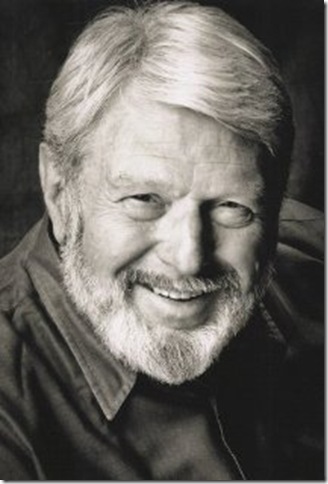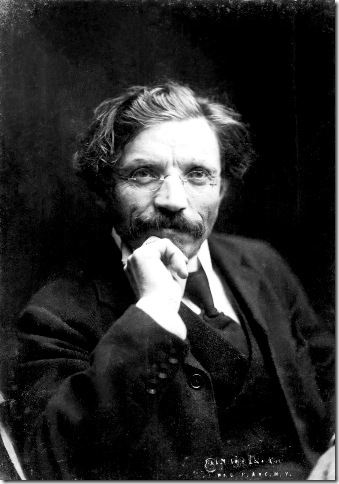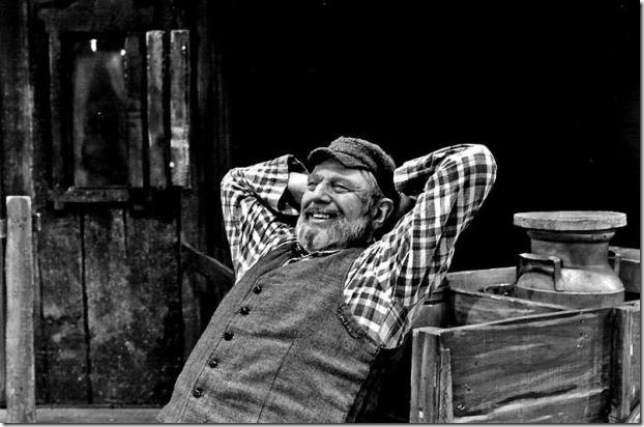Actor-activist-folk troubadour Theodore Bikel turned 90 in May, the year he celebrated 75 years in show business. Born in Vienna in 1924, he fled Austria with his family 14 years later as the Nazis occupied his native land.
So he knows firsthand what it is like to be uprooted from your home, just as Tevye the dairyman — a role Bikel has played more than 2,000 times — was in Fiddler on the Roof.
This Sunday afternoon, the 25th annual Donald M. Ephraim Palm Beach Jewish Film Festival, a program of the Mandel JCC, closes with a new documentary, Theodore Bikel: In the Shoes of Sholom Aleichem, which interweaves his life and career with that of the man whose folk tales inspired the classic Broadway musical.
“I have been living with Sholom Aleichem almost all my life,” says Bikel from his California home. “When I got to play Tevye so many times, it occurred to me that there was greater depth to the Tevye that Sholom Aleichem wrote than the one that finally emerged in ‘Fiddler on the Roof.’ Understandably, because that’s a musical that’s broader and for general consumption. I knew that the Tevye that I knew from the books, the books have been in my family forever, have had greater depth to them and also quite a bit more tragedy.”
His memories of hearing Aleichem’s tales go back to his childhood in Vienna. “What comes to mind is that my father was sitting around the table after dinner and reading from Sholom Aleichem, in Yiddish,” Bikel says. “A short story, a monologue, sometimes a whole play which he couldn’t read in one evening, but he would read one act a night.
“And this lived with me. It lived with me in the language that Sholom Aleichem wrote. It was much, much later that I would read and re-read him in translations, in English, also in other languages. I always found that the translations, as good as they were, had some element missing, the element of familiarity. Of course I never lived in a shtetl, but the shtetl lived with me.”
Bikel has played Teyve more than any other performer, avoiding the Borscht Belt shtick than so many actors resort to. “I’m so much closer to him than anybody else, frankly,” says Bikel. “Because I was playing my own grandfather.”
Through the specifics of his own family, Bikel has been able to connect with the show’s universality. “When the show was just mounted, they predicted a very short life for it. They said, ‘Once you run out of Jewish audiences, that’s it, you’ve run out of the audience for the show.’ They were totally wrong. Why? Because when art is good, it is universal. Sure, the canvas on which you paint something is narrowed ethnically, sometimes linguistically, sometimes ethnically, but if the work is excellent, then it is widely understood by everybody.
“When ‘Fiddler’ was first done in Japan — in Japanese —Joe Stein, who wrote the book, flew over for the opening. And one of the promoters of the show said to him, ‘This play, a big success in America?’ And Joe said, ‘Yes, a big success.’ And the other guy said, ‘Strange, it’s so Japanese.’ ”
I interviewed Bikel 20 years earlier, when he was coming to the Kravis Center to play, yes, Tevye the dairyman. He told me then that it was a role he doubted he would ever tire of performing. Reminded of his statement, he now says, “Look, the last time I did it was in 2010, only four or five years ago. Sure, I’ve changed over the years. When I first played him I had to put gray streaks into my beard when I played him. At last, I had to put dark streaks into my beard.
“It is an eternal thing, but after doing the show the last time, I decided to hang up my milk pail. I couldn’t do that now eight times a week.”
Bikel is also noted for creating the role of Captain Georg von Trapp in the original Broadway cast of 1959’s The Sound of Music.
“Everybody was so excited to do it because of Rodgers and Hammerstein, and Mary Martin,” he recalls. “For me, I had never done a musical before. To me, it was just another play that happened to have music in it.
“I wanted to play the character as truthfully as possible, seeing that he came from a period that I was quite familiar with in Austria. And he resented the Nazis because they were so crude and barbaric, and that’s why he felt he had to take his family and get out. For me, getting out was a very different matter. But there were parallels and I could see them, I could play them.
“Out of town, before going to Broadway, (characters in the show) wore swastika armbands and they greeted each other with ‘Heil Hitler!’ By the time we hit Broadway, there were no swastikas, no ‘Heil Hitlers,’ it was just ‘Heil.’ And I felt that there was a softening of the edges.” He says. “Later productions re-introduced those elements that I felt were softened.”
In the movies, Bikel has been a chameleon, playing a Southern sheriff in The Defiant Ones, a German U-boat officer in The Enemy Below, a Russian submarine captain in The Russians Are Coming, The Russians Are Coming and Hungarian linguist Zoltan Karpathy in My Fair Lady, to name a few of his 50 big-screen roles.
Of his ability to avoid being typecast, he says, “I’m a character actor. I change shapes, I change accents, I change the way I walk and talk, sometimes I change the way I look. I do roles and they go, ‘Oh, wow, we didn’t know he could do that.’ That pleases me.”
But it seems clear that Bikel takes a special pride in In the Shoes of Sholom Aleichem, which is on the festival circuit prior to commercial runs. Asked why he thinks local movie fans should see it at the Palm Beach Jewish Film Festival, he says without hesitation, “Because I’m really damn good in it.”
THEODORE BIKEL: IN THE SHOES OF SHOLOM ALEICHEM, The Donald M. Ephraim Palm Beach Jewish Film Festival, Muvico Parisian 20, CityPlace,, West Palm Beach, Sunday, 2 p.m. Call: 877-318-0071.


